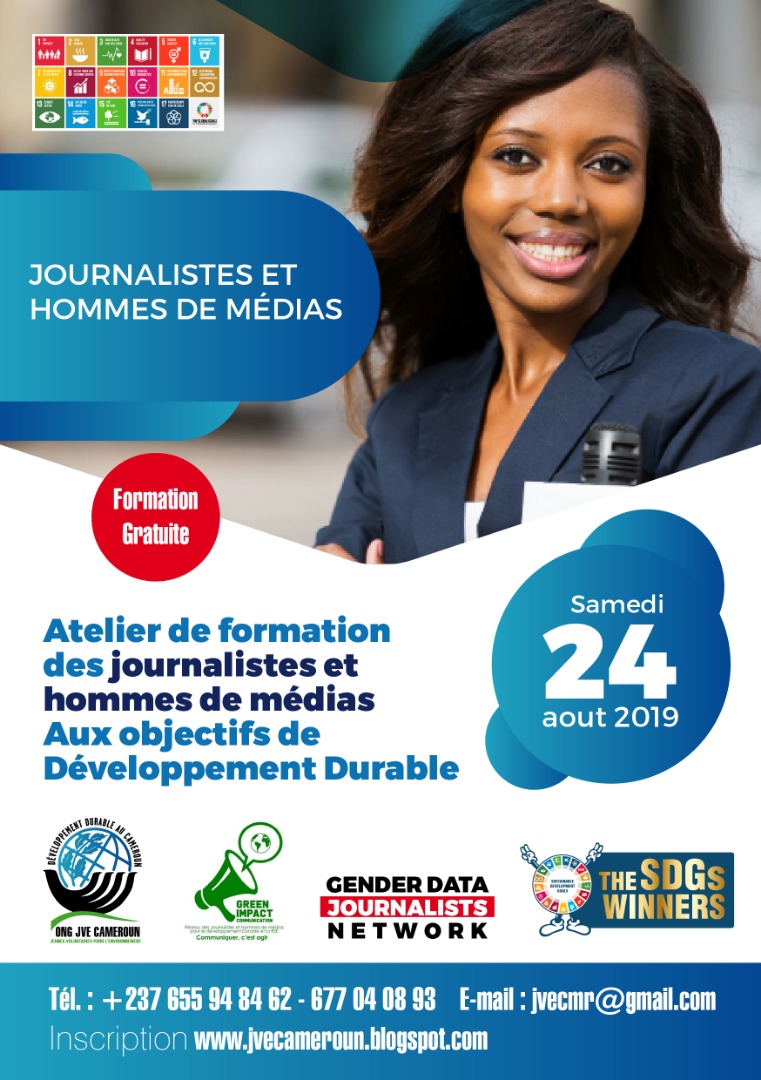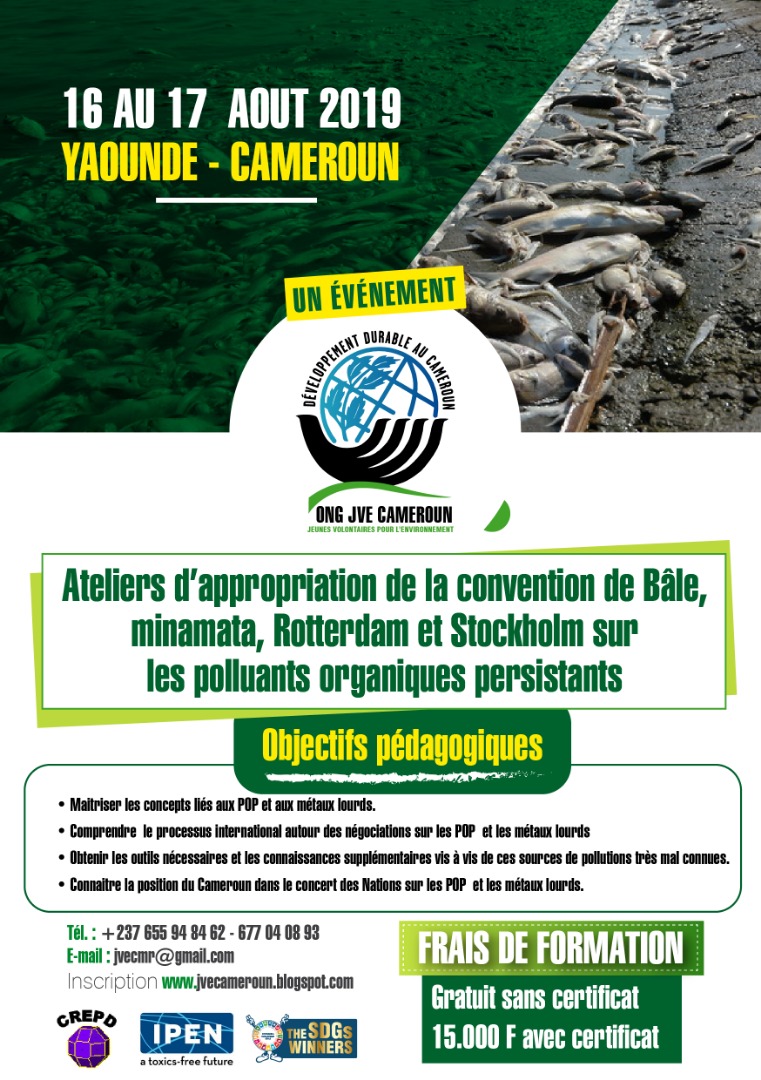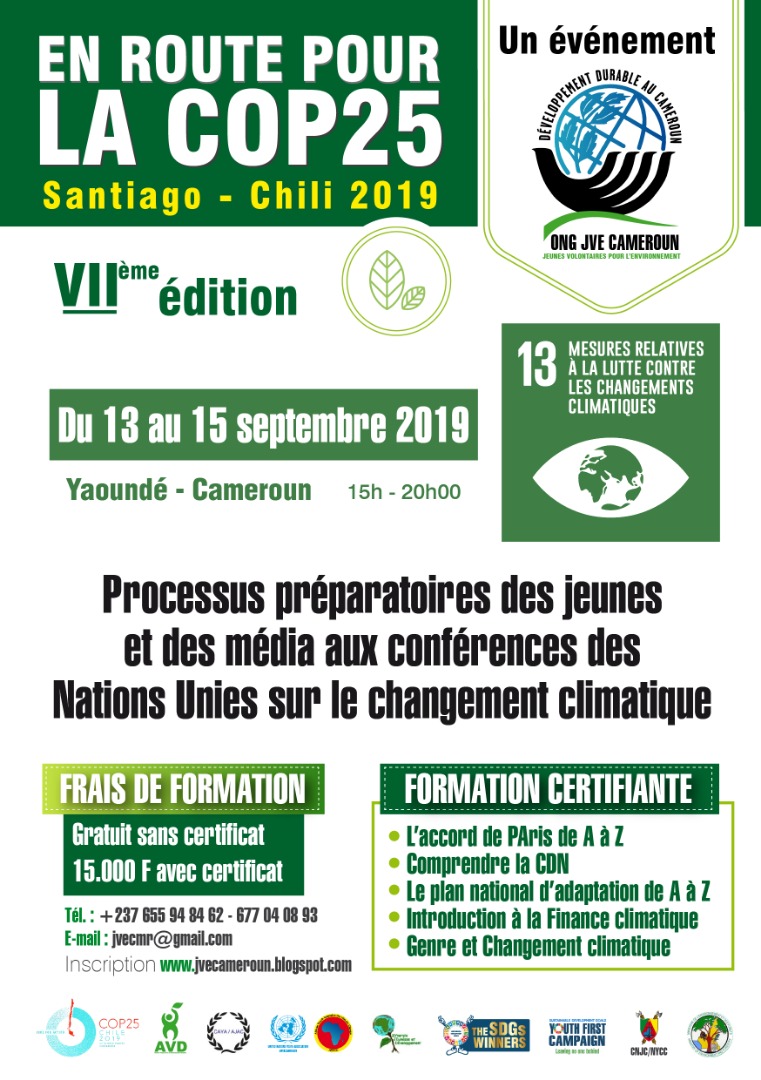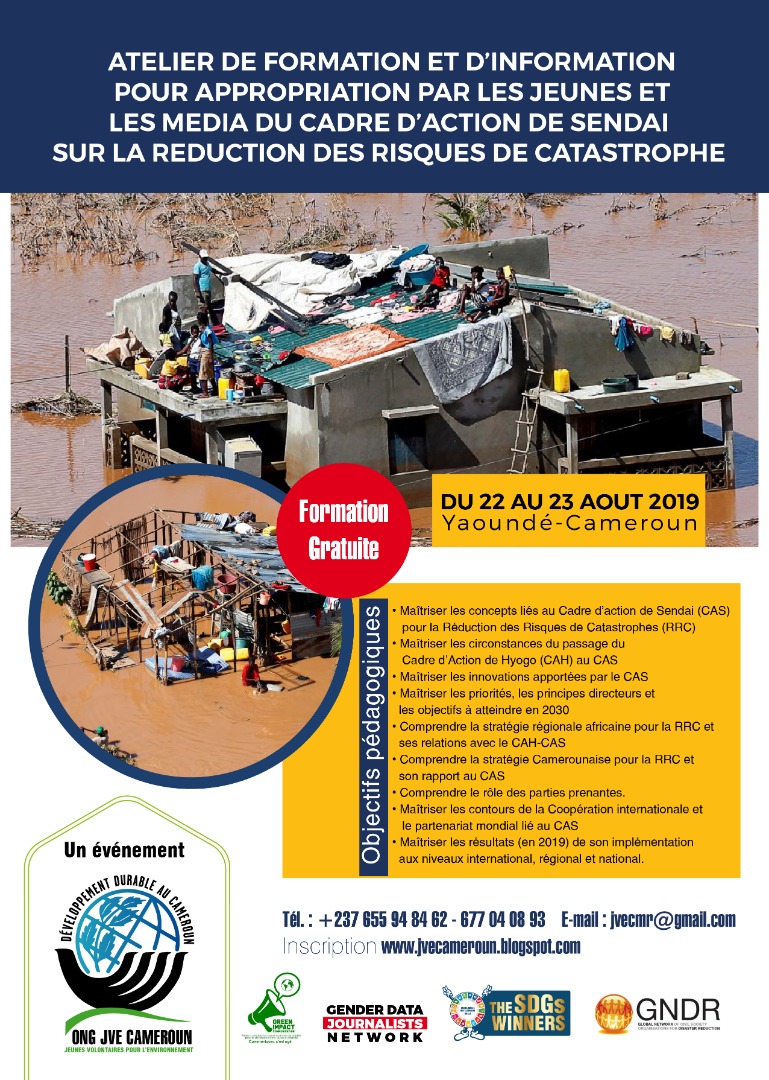African Youth – Road to Rio+20
YAOUNDE+20
African Youth Preparatory Process for RIO+20
Processus préparatoire
à la participation de la jeunesse aux conférences des Nations Unies sur le
développement durable (RIO+20) et le changement climatique (COP18)
PHASE
II
Lieu : Yaoundé-Cameroun
Date : 29 Mai au 01
Juin 2012
TERMES DE REFERENCES
Qui ?
Les leaders d’association de jeunesses ayant des actions en relation
avec le développement durable et /ou
le changement climatique, les ONG s, les professionnels du
développement, les étudiants, les jeunes chercheurs, les journalistes, etc…
Quoi?
Structuration et renforcement des
capacités de la jeunesse africaine pour une participation efficiente aux conférences
des Nations Unies sur le Développement Durable
RIO+20 et sur le changement climatique C0P 18 « African Youth Road to Rio+20 »
Où ?
Yaoundé, capitale du Cameroun
Quand ?
29 Mai au 01 Juin 2012
Combien de participants ?
100
I.
Contexte
et justification
a.
Contexte
La conférence
des Nations Unies sur le développement durable Rio + 20 sera sans aucun doute
un tournant majeur dans l’histoire des négociations internationales et représente
de ce fait, pour nous la jeunesse, une opportunité à saisir afin de faire
entendre sa voix lors les négociations à venir. Rio
+20 sera l’occasion d’évaluer vingt ans de construction d’une formule de
développement longtemps présentée comme idéale ; le développement durable,
mais aussi l’occasion d’entrevoir un développement vert pour les
années à venir. Cette conférence intervient dans un contexte climatique des
plus alarmants et à un moment ou le calendrier mondial nous indique que nous
sommes à mi parcourt de la date buttoir pour l’atteinte des objectifs du millénaire
pour le développement (2015)
Conscient de la nécessité pour la jeunesse
de se construire une maîtrise du labyrinthe du
développement durable et des changements climatiques, les chefs d’états
africain par la voix du président Obiang
Nguema Mbasogo, président en exercice de l’Union africaine, ont souligné à
l’occasion du 17ème Sommet de l’Union Africaine l’importance de l’implication
et de la participation de la jeunesse dans le processus de développement . L’autonomisation
de la jeunesse étant gage du développement durable demande une
connaissance parfaite des enjeux. La jeunesse
garante de la pérennité des actions d’aujourd’hui,
doit jouer un rôle important dans ce processus élaboration des politiques. Ainsi,
sa formation, sa préparation et sa participation constituent la pierre angulaire d’une réelle implication.
Dans la double
perspective d’assurer une compréhension efficiente de la des enjeux des négociations sur le développement
durable et le changement climatique et dans l’optique d’accroitre une
participation de qualité de la jeunesse africaine dans les fora internationaux
sur les enjeux environnementaux intervient
cet atelier de formation. Seconde d’une série qui nous permettra à terme
d’atteindre des objectifs succinctement définis.
b-
Justification
Les conférences des Nations Unies
sur le développement durable et le changement climatique constituent un vaste processus dont la
compréhension et les mécanismes nécessitent une préparation préalable efficiente. La jeunesse africaine doit s’armer
d’outils et de stratégies lui permettant
de développer une action concertée. L’implication et la participation de
la jeunesse, la structuration et l’harmonisation de ses positions constituent
les fondamentaux.
A l’image des précédentes
conférences, la jeunesse sera une fois de plus au rendez –vous de Rio+20. Vingt
ans après le premier sommet de la terre, il est question d’assurer un engagement
politique renouvelé au développement durable et de relever de nouveaux défis.
Au regard de ces enjeux les jeunes se sentent interpellés et se préparent à
montrer une fois de plus leur propre engagement. En effet, l’équilibre entre
les besoins des générations actuelles et ceux des générations futures sous le
spectre d’une économie verte se présente comme une nébuleuse au contour fort
ambigu.
Face à ces différentes
échéances s’inscrit cette formation deuxième du genre, donc l’objectif est la
préparation de la jeunesse au processus. Aussi, l’avenir de la planète étant
plus que jamais en jeu, une connaissance parfaite de la situation est un atout
majeur pour les jeunes, leaders de demain.
II.
Objectifs
Objectif global
Rendre plus efficace et efficiente la
participation de la jeunesse africaines aux processus de prises de décisions
sur l’avenir de la planète
Objectifs spécifiques
·
Renforcer les capacités des jeunes africains
à la compréhension des enjeux du développement durable à l’échelle continentale
et mondiale
·
Doter les jeunes d’aptitudes techniques
et managériales pour la conduite des
négociations sur l'environnement et le développement durable au niveau mondial.
·
Recueillir les attentes et les
harmoniser pour une position et stratégie communes de la jeunesse africaine.
·
Poser les bases de la mise en place et le
fonctionnement d’un groupe de travail de la jeunesse sur le climat et le développement durable sous
la bannière de l’Initiative Africaine de la jeunesse sur les Changement
climatique (AYICC)
III.
Résultats
attendus
Les
principaux résultats attendus de cette formation sont les suivants :
·
La jeunesse africaine comprend mieux les
enjeux du développement durable et du changement climatique.
·
La jeunesse africaine est mieux outillée
pour la conduite des négociations au niveau mondial
·
Les différentes attentes sont
recueillies et une position commune de la jeunesse africaine est adoptée
·
Les bases de la mise en place et du
fonctionnement d’un groupe de travail de la jeunesse africaine sur le
développement durable et le changement climatiques sont posées et adoptées de
façon consensuelle.
IV.
Activités
Des activités phares
marqueront cette formation:
Ø Lancement
d’une campagne de communication médiatique pour informer les différentes
parties prenantes. Cette activité mener par l’équipe de JVE membre du Comité
technique d’organisation s’articulera autour des points suivants :
·
Conception des outils de communication
·
Lancement de l’appel à candidature
·
Etude des candidatures et sélection des
participants
Ø L’organisation
de l’atelier de formation il s’agira de mobiliser tout les moyens matériels
humains et techniques pour la mise en route de l’atelier
·
Conception
des modules de formation
·
Acquisition
du matériel, réservation d’hôtels etc…
·
Accueil
et installation des participants à Yaoundé
Ø L’atelier de
formation proprement dit, il va durer 4 jours et va s’articuler autour des
points suivants
·
Enseignements
sur le Développement durable et les enjeux de RIO 2012
·
Simulation
de la conférence des Nations Unies sur le développement durable RIO+20 (Yaoundé+20) à travers des jeux de
rôles incluant les participants.
·
Brainstorming
pour le recueil des attentes des participants de différentes nationalités
·
Séance
de planification participative pour
arrêter une position commune de la jeunesse africaine à partir des
attentes exprimées
·
Séance
de travaux de groupes pour l’édification des bases du groupe de travail des
jeunes d’Afrique pour le développement durable et le changement climatique
·
Election
au suffrage universel des personnes devant animer ce groupe
·
Désignation
de deux (02) délégués devant parler au nom de toute la jeunesse africaine à Rio
sous l’égide d’AYICC
Ø L’évaluation de
la formation elle sera réaliser par les participants ceux-ci auront à se
prononcer sur les points suivants
·
La
qualité de l’accueil
·
La
pertinence des modules de formation
·
La
qualité de la formation et des formateurs
·
La
qualité des repas
·
L’organisation
générale de la formation
1-
le développement durable
- Comprendre le
concept de durabilité et introduction sur la conférence des Nations Unies sur le
développement durable
-
RIO+20 opportunités et défi pour l’Afrique
- Economie
verte et enjeu du développement durable : quel perspective pour la jeunesse africaine
- comment
promouvoir des emplois verts, décents et productifs pour les jeunes en zones
rurales
- responsabilité
sociale en entreprise et enjeux d’une économie verte
- Décryptage de
la déclaration de la jeunesse africaine
- restitution du
forum des emplois vert de Niamey
2- les changements climatiques
- Comprendre le changement climatique en Afrique (causes, conséquences, manifestations, liens entre le changement climatique et le
développement durable, etc.),
- La
gouvernance internationale du climat (CCNUCC, AWG-LCA, SBSTA, etc.) et état des négociations internationales sur
le climat (Protocole Kyoto, Accords de Cancun, Plateforme de Durban, Fonds Vert
Climat, etc.)
- Les liens entre les forêts et le changement
climatique, REDD+ : définition, enjeux et opportunités en Afrique pour les communautés forestières et les
jeunes
V.
Projection - Réchauffement Climatique
Elle est ouverte
à un public autre que celui de la formation, elle permettra d’étayer les
modules reçus.
VI.
Méthodologie
L’approche
utilisée pendant cet atelier consistera : en des exposés suivis des débats
fait par des experts et des jeunes leaders, en des projections, en des
réflexions de groupes, en des simulations et des discussions. Pendant trois
jours, on abordera les fondamentaux du développement durable et des changements
climatiques puis suivra une simulation des négociations environnementales
internationales. La première journée
sera consacrée aux enseignements sur le changement climatique, la
seconde nous permettra d’aborder les
fondamentaux de la notion de développement durable, le troisième jour on cernera le concept d’économie verte et enfin le quatrième jour interviendra une simulation pour se mettre dans la peau
des négociateurs. Aussi il sera question
de faire un bilan d’évaluation du
séminaire et de définir un plan d’action stratégique de la jeunesse d’ici la
COP 18.
VII.
intervenants sollicités
Blondel SILENOU, Point focal du Group
Majeur des Enfants et des Jeunes
Jean Paul AFFANA, Point focal du Group
Majeur des Enfants et des Jeunes
Ulrich WAFFO, Consultant junior
Augustine
B NJAMNSHI, BDCP Cameroon
Eric
Parfait ESSOMBA, CED
Samuel NNAH NDOBE, CED
Timothée KAGOMBE, MINEPDED
Cédric FOUMENA, GRH, RSE, SOCIETAL
Dr. Jean
marc FEUSSOM, Action Solitaire (MINEPIA)
Dr. DENIS SONWA, CIFOR
Dr Joseph armathee AMOUGOU, MINEPDED
Christian GYR, Greenpeace
(Suisse)
Mestre Guilherme
Dos Santos Barboza CABEPEC (Bresil)
VIII. Participants
La formation est ouverte à tous les jeunes et organisations
africaines de jeunes traitants des questions relatives à l’environnement, au
changement climatique, et au développement durable, une priorité est accordée
aux pays de la sous région Afrique
Centrale. Son également convié les jeunes acteurs du secteur privé et public et
les partenaires au développement. Autorités administratives en charge de
l’environnement et du climat.
Participation à
l’atelier
La
participation à la formation est soumise à :
Le
formulaire est disponible à l’adresse
Bien
vouloir le remplir avant le 15 Mai 2012 ;
-
une étude du comité d’organisation pour évaluation et sélection.
-
par le payement des frais de participation qui s’élève à 10.000 FCFA et 25.000FCFA par personne respectivement pour les nationaux et pour
les Etrangers. Le paiement de ces frais donne droit à un kit de participation
et aux différents repas et pause café. Aussi les participants recevront un
diplôme attestant qu’ils ont suivi une formation internationale introductive dans
le domaine du changement climatique et du développement durable.
Les
participants étrangers résidant au Cameroun seront traité au même titre que les
nationaux
NB une
bourse de réduction de 30% sera disponible du 23
Avril et le 07 Mai 2012
-Le
comité d’organisation prendra également en charge le logement des candidats internationaux retenus L’obtention
du diplôme est soumise à un examen et une assiduité au module de la formation.
Contact Téléphone : +237 75 71 81 35 +237 96 25 72 14 Courriel : jvecmr@gmail.com
http://jvecameroun.blogspot.com





















